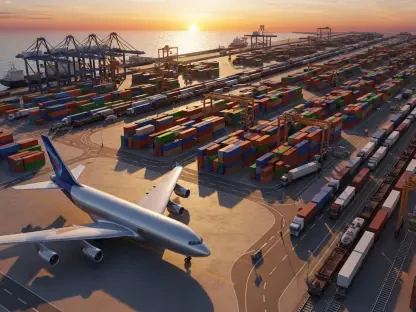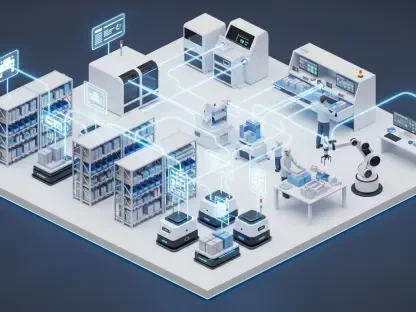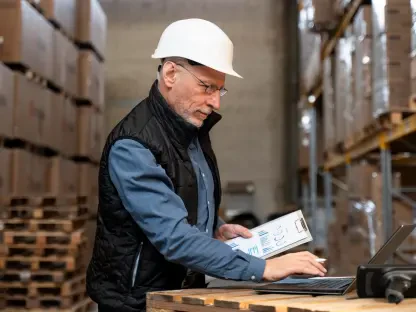Hyundai Motor India Limited (HMIL) is leading the charge in transforming sustainable logistics in India by embracing rail freight for domestic vehicle transportation. This strategic move not only enhances delivery efficiency but also significantly reduces emissions, aligning with broader environmental goals.
Introduction to the Initiative
Hyundai Motor India Limited (HMIL) is making waves in the logistics sector by decisively opting for rail freight to move domestic vehicles across India. This groundbreaking initiative not only propels efficiency in delivering vehicles nationwide but also slashes emissions dramatically, showcasing a commitment to environmental stewardship. This innovative approach spearheaded by Hyundai underscores the potential of rail freight in revolutionizing the logistics landscape in India. By leveraging rail infrastructure, the company not only facilitates timely deliveries but also sets a new standard for sustainable business practices. Hyundai’s dedication to this initiative is reflective of a broader global trend towards reducing carbon footprints and adopting eco-friendly logistics solutions. The move not only benefits Hyundai but also serves as a model for other enterprises aiming to balance operational efficiency with environmental responsibility.
Key Developments and Achievements
Significant Milestones in 2024
In 2024 alone, Hyundai Motor India Limited accomplished a remarkable feat by transporting 156,724 units via rail. This substantial number represented 26% of Hyundai’s total domestic wholesale volume, highlighting the company’s robust shift towards sustainable logistics. The impact of this shift is further underscored by a significant reduction in carbon dioxide emissions, amounting to 18,352 tonnes. This transition to rail freight is not an isolated achievement but part of a broader, sustained strategy. Between 2021 and 2024, Hyundai transported 537,499 units through railways, markedly reducing its carbon footprint by a staggering 63,452 tonnes of CO2. These achievements reflect Hyundai’s unwavering commitment to environmental sustainability and its strategic vision of integrating eco-friendly practices into its core operations.
Long-term Environmental Impact
Hyundai’s consistent adoption of rail freight has had a profound long-term environmental impact, setting a benchmark within the automotive industry for sustainable logistics. By prioritizing rail over road transport, the company significantly reduces its carbon footprint and aligns its operations with global environmental goals. The decisions made today by companies like Hyundai hold the potential to influence the industry’s trajectory for years to come. The utilization of rail freight not only benefits the environment but also showcases Hyundai as a leader in green logistics. This strategic foresight ensures that the company remains ahead of the curve, proactively contributing to a greener future. As nations worldwide gear towards more environmentally friendly practices, Hyundai’s sustained commitment positions it as a trailblazer, inspiring other corporations to follow suit and prioritize sustainability in their logistics operations.
Strategic Focus on Rail Freight
Sriperumbudur Dispatch Hub
A pivotal element in Hyundai’s operations is the dispatch hub located in Sriperumbudur, Chennai, which plays a critical role in ensuring the timely and eco-friendly dispatch of vehicles across India. This facility stands as a testament to Hyundai’s dedication to reducing environmental impact through strategic logistics planning. Particularly notable is the North-East region’s complete reliance on rail for vehicle deliveries, exemplifying Hyundai’s adept use of India’s extensive railway infrastructure. The strategic focus on the Sriperumbudur dispatch hub exemplifies Hyundai’s commitment to leveraging railways for sustainable logistics. This facility not only ensures efficient vehicle dispatch but also significantly minimizes the environmental footprint associated with traditional road transport. The comprehensive utilization of railways in the North-East, where Hyundai achieves 100% vehicle delivery via rail, underscores the company’s strategic foresight and operational excellence.
Leveraging India’s Railway Infrastructure
India’s railway network, the fourth-largest in the world, is a cornerstone of Hyundai’s logistics strategy. This extensive network facilitates the movement of 26 million passengers daily and manages 3.37 million tonnes of freight, underpinning its critical role in national transportation. Hyundai’s strategic partnerships and integration with India’s railway infrastructure have allowed the company to capitalize on this vast network, enhancing its logistics operations’ efficiency and sustainability. The modernization efforts within the Indian rail system, which saw freight volumes managed by Indian Railways surge by 157% from 2021 to 2023, further bolster Hyundai’s logistics strategy. The implementation of the Dedicated Freight Corridors (DFCs) in December 2020 signifies a pivotal shift, aiming to substantially increase rail’s share of freight traffic from 28% to 44% by 2051. Hyundai’s alignment with these infrastructural advancements highlights its commitment to sustainable logistics and long-term strategic planning.
Synergy with Government Initiatives
Dedicated Freight Corridors (DFCs)
The Indian government’s investments in railway infrastructure, particularly the Dedicated Freight Corridors (DFCs), have paved the way for enhanced efficiency in freight movements and reduced congestion on conventional rail routes. These projects are designed to boost handling capacity, allowing for greater freight volumes and stimulating economic growth. Furthermore, the DFCs aim to significantly mitigate environmental impacts by shifting a substantial portion of freight traffic from road to rail. Hyundai’s logistics strategy is intricately aligned with the objectives of the DFC projects. The company’s foresight in integrating these infrastructural developments into its logistics operations not only optimizes its supply chain but also reinforces its commitment to environmental sustainability. The synergy between Hyundai’s logistics initiatives and government projects showcases a collaborative effort towards achieving shared environmental and economic goals, setting a precedent for industry-government cooperation.
Alignment with National Goals
According to Tarun Garg, the Whole-time Director and Chief Operating Officer at Hyundai Motor India Limited, the company’s logistics operations are in harmony with India’s rail infrastructure ventures. This alignment underscores Hyundai’s efforts to support national initiatives aimed at sustainability and economic development. By leveraging India’s robust railway network, Hyundai optimizes logistics costs while contributing to broader national objectives. Hyundai’s strategic logistics operations reflect a deep commitment to supporting India’s national goals. The integration of environmental sustainability with economic development in Hyundai’s business model exemplifies a forward-thinking approach that benefits both the company and the nation. As India continues to invest in modernizing its railway infrastructure, Hyundai remains a key player in driving the country’s commitment to reducing emissions and fostering sustainable economic growth.
Economic and Environmental Impact
Cost Optimization and Sustainability
Hyundai’s strategic logistics operations have not only optimized costs but also supported national goals for sustainability and economic development. By seamlessly integrating India’s extensive rail network into its logistics framework, Hyundai effectively reduces costs associated with vehicle transportation. This strategic alignment with governmental initiatives underscores the company’s commitment to contributing positively to India’s economic and environmental objectives. The cost benefits realized through this approach are substantial. Rail transport, being more fuel-efficient and capable of moving large volumes over long distances, presents a significant reduction in transportation expenses. This economic efficiency is complemented by the environmental advantages of rail freight, as it generates considerably lower emissions compared to road transport. Consequently, Hyundai’s logistics strategy stands as a model for other corporations seeking to balance cost optimization with a robust commitment to sustainability.
National Logistics Policy and Future Projections
Prime Minister Narendra Modi’s expedited National Logistics Policy aims to transform India’s logistics landscape by reducing logistics costs from 15% of GDP to 8% by 2030. This ambitious policy enhances the cost-effectiveness and environmental sustainability of freight transport. The policy’s successful implementation could significantly bolster the country’s economic growth while promoting greener logistics practices. A study conducted by the University of New South Wales suggests that the DFCs could augment India’s GDP by ₹16,000 crore. Additionally, studies such as the Rail Partners’ ‘Freight Expectations’ indicate that rail freight emits 81% less particulate matter compared to road freight. These findings highlight the considerable environmental and economic benefits of embracing rail freight, regardless of the electrification status of the rail networks. Hyundai’s alignment with these futuristic projections positions the company favorably within India’s evolving logistics landscape.
Future of Sustainable Logistics
Expansion and Long-term Goals
With the anticipated expansion of the Dedicated Freight Corridors (DFCs), Hyundai is poised to further diminish its environmental footprint while simultaneously enhancing distribution efficacy. This futuristic outlook aligns with global priorities centered on sustainability and environmental conservation. Hyundai’s proactive steps in adapting rail freight reflect a well-structured approach aimed at achieving long-term sustainability goals. Amid a global shift towards sustainable logistics, Hyundai’s efforts provide a practical framework that other corporations can emulate. The expansion of DFCs will facilitate faster and more efficient vehicle transportation, reducing delivery times and enhancing customer satisfaction. This commitment to environmental and operational excellence ensures that Hyundai remains a leader in the automotive industry, paving the way for future innovations in sustainable logistics.
Collaborative Synergy
The collaboration between public and private sectors, as exemplified by Hyundai and the Indian government’s efforts, is expected to drive substantial environmental and economic advantages in the future. This synergy underscores the importance of coordinated efforts to promote sustainable practices across industries. Hyundai’s proactive approach in integrating government projects with its logistics strategy highlights the potential for mutually beneficial partnerships. The collaborative efforts between Hyundai and the Indian government set a powerful precedent for how private enterprises can work alongside public initiatives to achieve common sustainability goals. By aligning its operations with national projects like the DFCs, Hyundai reinforces the critical role of synergy in driving economic and environmental progress. This partnership not only benefits Hyundai but also contributes significantly to India’s broader objectives of sustainable development and economic growth.
Conclusion
Hyundai Motor India Limited (HMIL) is at the forefront of revolutionizing sustainable logistics in India. They have prioritized the use of rail freight for transporting vehicles domestically. This strategic decision enhances delivery efficiency and substantially decreases emissions, which is in line with broader environmental objectives. By shifting a significant portion of their vehicle transport to rail, Hyundai is reducing their carbon footprint and contributing to the reduction of road congestion and wear. Rail transport is known for its efficiency and lower environmental impact compared to traditional road transport, and Hyundai’s initiative sets a precedent for other automotive companies in India. By adopting rail freight, HMIL not only boosts its operational efficiency but also sets an example for corporate responsibility towards environmental sustainability. This move is a significant step forward in the automotive industry’s quest for greener logistics solutions. It demonstrates Hyundai’s commitment to innovation and environmental stewardship, reinforcing their role as a leader in sustainable practices within the industry.









